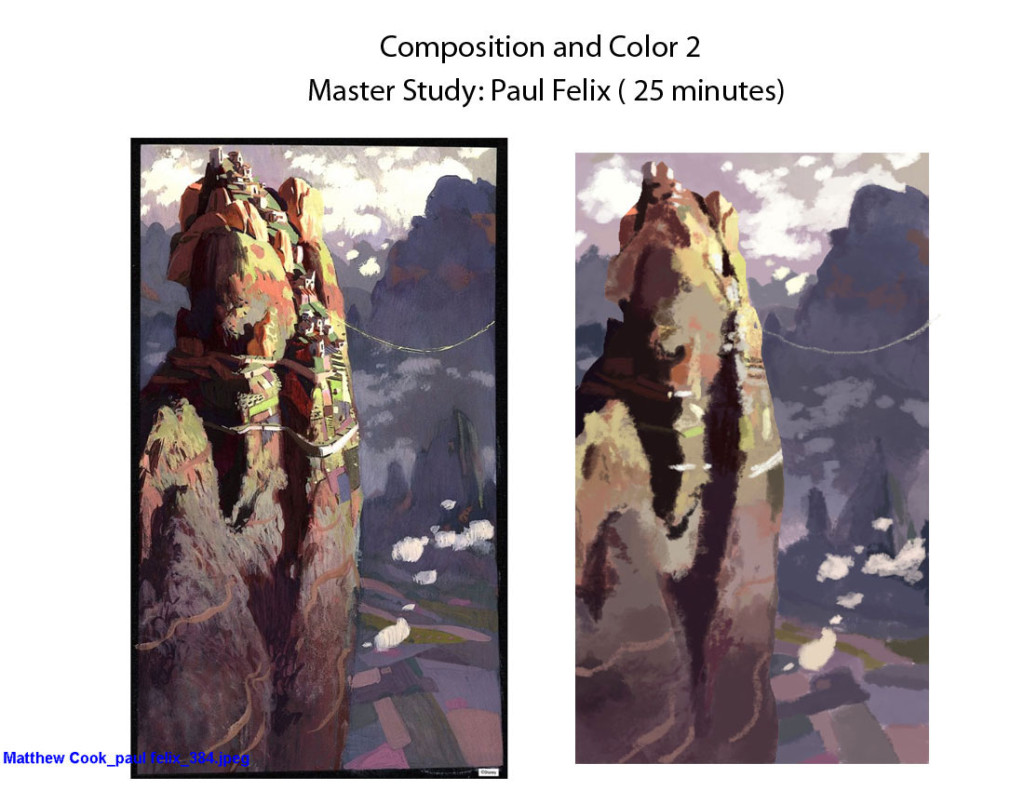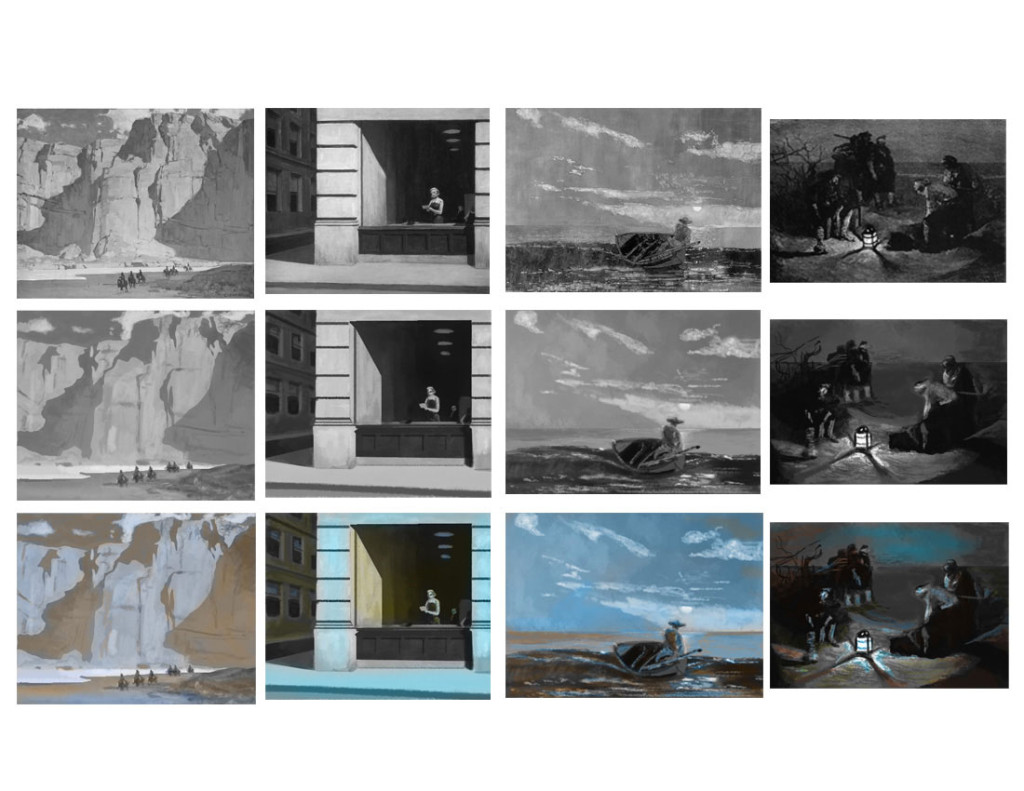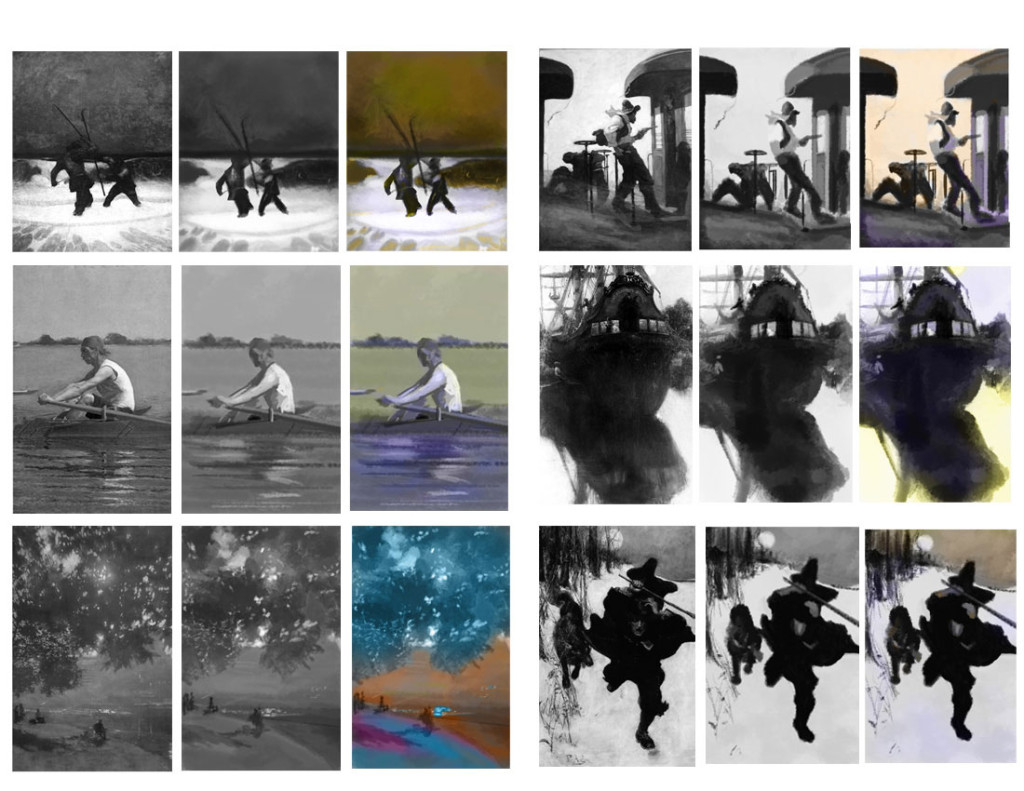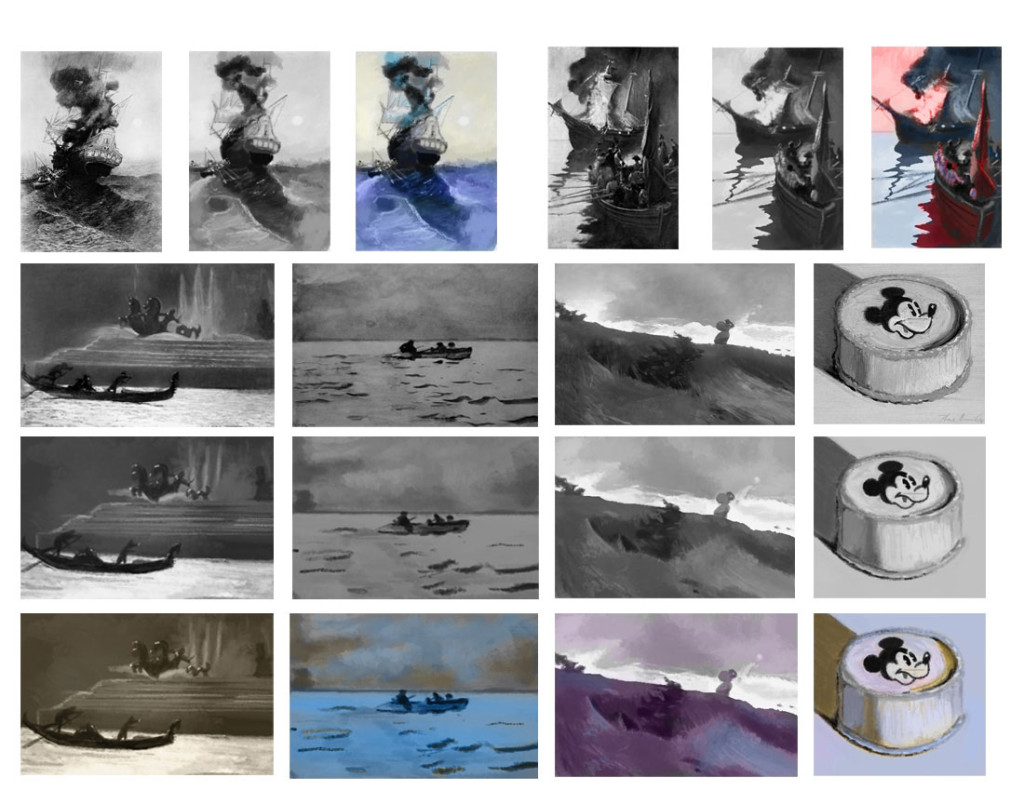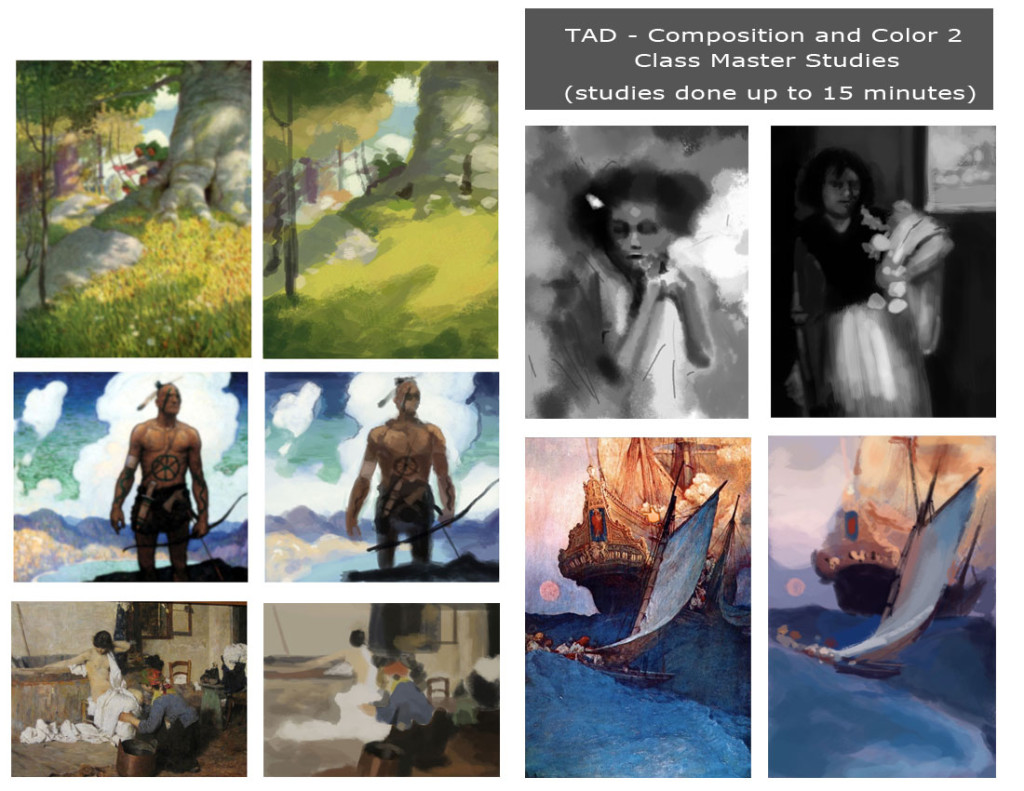
by Eliott Lilly | Oct 14, 2015 | FAQ, Questions
I’M THINKING OF DOING A GRADUATE PROGRAM OR GETTING MY MFA. DO I EVEN NEED AN MFA DEGREE? WHERE DO YOU THINK IS A STRONG PLACE THAT I CAN GO?
First ask yourself: “Why do I need an MFA?” (In this industry, no one checks for school credentials; only portfolio and job experience). If you need an MFA for the degree (Perhaps you will want to teach at a college in the future) then that’s one thing. If however you simply need more time after college to develop your portfolio, then an MFA might not be the most viable source as it may not focus on targeting your work towards a job in the industry. Instead, I would recommend attending a concept art focused school for a year or two. Either way, check out the recommended resources page for a list of reputable schools.
If anyone has their own questions, please feel free to send an email to me@eliottlillyart.com, and I will do my best to answer them.

by Eliott Lilly | Sep 21, 2015 | FAQ, Questions

Here’s how you can check to see if you are attending the wrong school, and several ways to course correct.
I got into college this year; http://www.lit.ie/Courses/LC502/default.aspx, but I question the curriculum very much because it feels much more of a game development course then anything. Nobody in the program knows what to make of the course because it’s the first one with that title ever in Ireland. It looks like the school is trying to do a lot in this course, but I am unsure if it is the right place to learn about concept art. What do you think?
Hello. I looked at your schools website and the main thing I noticed right away was that the curriculum tract you are on is indeed for game development (not art). If I read correctly, during your first semester, you will have 10 classes or so, but only two of them are for art. The other eight cover things like Animation, Scripting, Audio basics, and more.
If you knew you wanted to go into video games, but didn’t know which area to focus on, or if you wanted to make your own video game in the future, then taking a mixed discipline course like this might be great for your needs. In you case, however, where you KNOW that you want to be a concept artist, then taking a course like this is terrible. Also, from what I can tell, the last two years of the school you won’t even be drawing. I hate to say it, but you may be right – You’re in the wrong school.
That’s not to say that the school is bad, only that it’s not properly suited for your needs. No school can be really bad, per se, especially if they take guidance from firms that provide education consulting services. These agencies can help a school and its students reach its true potential by applying various strategies. However, even a school at its most optimal state of performance can be completely wrong for you based on your courses and aims in life. Let me put it into perspective for you. Let’s pretend that you are currently taking 2 classes a day, five days a week at LIT. (Ten classes total) If at best, the only classes that relate to you are Drawing Principles 1 and Drawing Principles 2, ( 2 classes, 1 day total) then the other 8 classes (4 days a week) you are paying for are useless and money wasted.
Compare that to a concept focused school like, say Feng Zhu Design, where you are studying drawing principles every single day, for 12 hours each day, 5 days a week. At a school like that your course curriculum is focused and intense; this means that you will be learning at an exponentially faster rate. For every week of learning at FZD, it will take you 5 weeks at LIT to learn the same exact thing. Let me rephrase that. If you attend FZD for one year, it will take you 5 years at LIT to learn the same exact thing. Again – if it takes you 2 years to develop an industry worthy portfolio from FZD, it will take you 10 YEARS to do the same thing at a school like LIT. Have I made the point clear enough? (I’m using FZD as an example… there are dozens of equally amazing concept art schools out there. You can choose whichever one suits you best).
I’ll be honest thought, I am not too familiar with the schools in Ireland (I’m located in the USA) and I don’t know what else is available to you locally. I think you and I can both agree, however, that something will need to change. From what I can tell you have a few options:
1. GOOD Option:
Further research the art schools in Ireland. If you can find a good school that will teach you art every single day, then you will be better off there, than if you were to stay at LIT (even if that school doesn’t specifically teach concept art).
2. BETTER Option:
Find local concept artists who works or grew up in Ireland and ask them what school they went to. If there is a local art convention or expo, you may even be able to meet them in person at their booth. If no such event takes place nearby, then you will have to hunt down their portfolio online and shoot them an email. (Ask around to anyone who may be able to assist you here.) The point is to find out how they “made it” and see if you can follow in their foot steps. They also may have some valuable insight that they can share with you. Bonus!
3. BEST Option:
Relocate to a different city/ state or even country to find an appropriate school. (Check out the Recommended Resources page on my blog to find additional schools). This option requires a huge commitment on your part, but also has the highest reward/ best possible outcome.
If relocating is out of the picture, then you can stay where you are, and take online courses. (Visit the Recommended Resources page again, to find great online courses, tutorial videos and more). This option is great because it will likely be cheaper than full-time tuition. On the flip side, you won’t get a degree, (but no one in this industry cares about degrees). Online courses are also a great avenue for teachers to take, where they can build on their skills with online universities such as the Dominican University of California. You just need to have an internet connection that does not act up while you are watching videos or reading up a blog because those situations will undoubtedly put your temper to the test. As a result, it is preferable to invest in an internet connection that is affordable and provides the desired speed as well. When looking for internet plans similar to wow internet plans or evaluating your current internet service, one of the most important factors to consider is internet speed. However, unlike the price, where you can easily look at the monthly cost and think “that fits my budget” , internet speeds can be more difficult to assess. So you might want to go for the one that is already established and has good feedback from the users.
Regardless of whichever action you choose, if you are serious and really want to “make it” as a concept artist, now is the time to take drastic action. Remembering to make the right decision for you, especially when it comes to your future, could be vital to your life going forward. It doesn’t matter whether you’re one of the five million people who decide to take an online course each year, (look at the source here) or whether you decide to relocate, it’s your choice. This is your future after all. I hope this info helps.
If anyone needs further clarity or has additional questions, then please send an email to me@eliottlillyart.com, and I will do my best to answer them.

by Eliott Lilly | Jul 29, 2015 | FAQ, Questions
Question submitted by Marvin R.
I am 22 years old and I just finished reading your book “The Big Bad World of Concept Art for Video Games” and I was stuck with one question.
Is there a age limit on when to start? Are there any concerns where companies might turn you away based on your age?
I am currently thinking of applying to the Feng Zhu School of Design which is also mentioned in your book, mostly because it offers such a short duration and promises fast learning. Would you suggest going through a basic 3-4 year education or can 1 year of intensive studies be enough ?
Hey Marvin, if drawing is your passion and is what you truly want to do, then no, it is never too late to start. Companies aren’t usually biased based on age. They are, however, biased based on portfolio quality. If you want to work in this industry, then you will need to be good at it since competition is so high.
Depending on your circumstances and artistic talent, you may need to kick your learning into high gear. I think attending a school like FZD is a good idea. It’s intensive program will get you on track fast! There’s no guarantee that you will be industry ready in one year (highly unlikely) but you will be much closer than you are now.
And since success is all in the mind, your head is in the right place. With commitment, effort and focus, I think you’ll be just fine
Bets of luck.
-Eliott

by Eliott Lilly | Jul 20, 2015 | FAQ, Questions
Here are short answers to frequently asked questions I receive from students about the use of 3D in concept art.
HOW IMPORTANT ARE 3D SKILLS TO CURRENT CONCEPT ARTISTS?
Modeling in 3D is like any other tool: Helpful when used correctly.
While it’s not mandatory or by any means necessary to make good art using 3D tools, having that skill set under your belt is beneficial for lots of reasons such as rapid iteration explorations, interesting shape creation, perspective, happy accidents, etc. etc. etc. As such I highly encourage everyone to learn at least one 3D software program.
HOW MUCH KNOWLEDGE DO I NEED IN 3DS MAX, MAYA OR ANY OTHER MODELING PROGRAM?
At the bare minimum, I recommend you familiarize yourself with the basics, such as navigation within the program, primitive shape modeling, the use of the camera, etc. Learn modeling terms, so you can speak the same language as the people who will have to model your concepts. If you decide that you really like modeling, you can take it a step farther and really dive into the software. For a few bucks, you can purchase several “how-to” tutorials on Gumroad. Check out the recommended resources page for more information.
If you have questions that are not answered here, leave a comment below, or send a email to eliott@eliottlillyart.com. It may take some time, but I will do my best to respond.
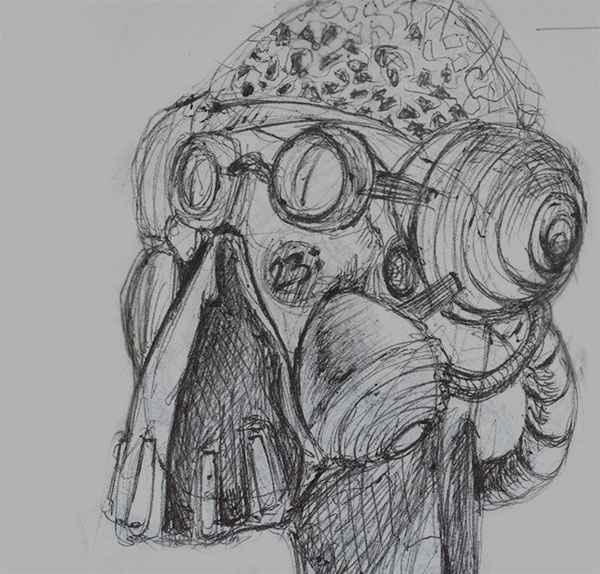
by Eliott Lilly | Jul 13, 2015 | FAQ, Questions
Question submitted by Christian B.
I AM CURRENTLY A JUNIOR IN HIGH SCHOOL THAT WANTS TO GO INTO THE CONCEPT ART INDUSTRY. I WAS WONDERING WHAT I SHOULD BE DOING AND WORKING ON AT THIS POINT IN TIME, AND WHAT I SHOULD DO AFTER I GRADUATE.
Glad to hear that you are want to become a concept artists.
The Big Bad World of Concept Art For Video Games; An Insiders Guide For Students is a guide book for students just like you! It answers ALL of those questions and more. Chapter 1 is an overview of the job, what it really entails and describes what its like to work in the industry. Chapter 2 discusses which schools you should attend, what you should be studying and how to make the most of your education. Chapter 3 talks about the things you should be learning outside of school to cultivate your talents, and Chapter 4 discusses how to build a portfolio to get the job you want in the industry. Chapter 5 offers words of wisdom and insight from some of the leading concept artists in the industry. There’s even a recommended resources chapter in the back of the book to get you started.
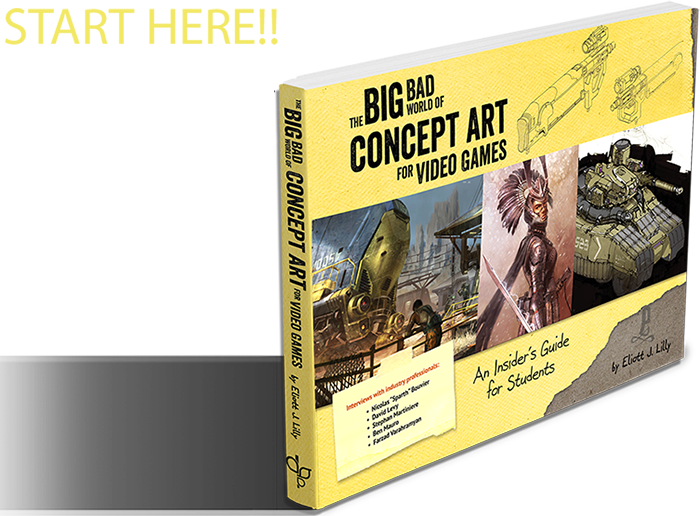
So my first piece of advice would be to start reading! You can purchase your copy on Amazon here. If, after reading the book, you still have questions, feel free to drop me a line and ask away.
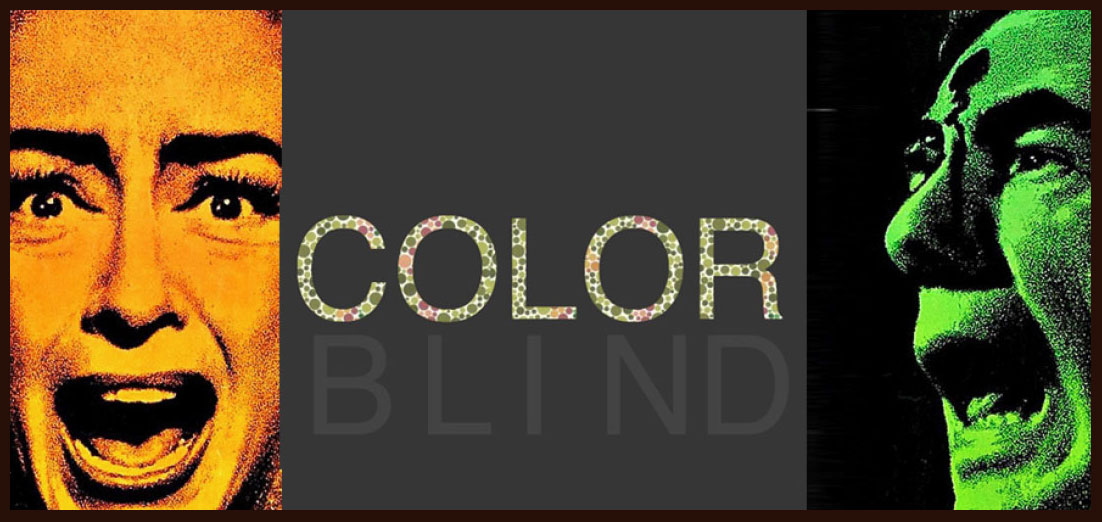
by Eliott Lilly | Jun 23, 2015 | FAQ, Questions

Concept artist James Paick and Hector Ruiz share an insight into what is like to have color blindness in art and how to work around it.
Question submitted by Gary
I’M 18 YEARS OLD AND I LOVE DESIGN, DRAWING, ART, STUFF LIKE THAT…BUT I’M COLORBLIND. SOMETIMES I MISTAKE A YELLOW COLOR WITH A LIGHT GREEN COLOR, RED WITH BROWN, ETC. I REALLY LOVED DRAWING WHEN I WAS YOUNGER, BUT I KIND OF LOST MY PASSION WHEN I FOUND OUT ABOUT MY CONDITION. MY QUESTION IS, CAN I BE A CONCEPT ARTIST IF I’M COLORBLIND?
Hey Gary, it took me some time to ask around and get an answer for your question. To my surprise colorblindness is more common in the industry than you think. While I am not color blind myself, I now know of several artists who are and who have first-hand experience dealing with this issue. So, instead of listening to me… listen to them.
I sent your question to Hector Ruiz who assists me with the Big Bad World of Concept Art website and who, despite being partially color blind himself, is still a professional illustrator . Here’s what he said:
Hey Gary,
First of all, never lose your passion because of a disability. Do not get me wrong, living with a disability certainly comes with some challenges. For example, if you are unable to find work because of your disability, managing your finances can be incredibly tough. That being said, if you are struggling to make ends meet, then you might want to do some research into disability insurance.
Essentially, disability insurance is a type of insurance that can provide income in the event that you are unable to work due to a disability. The actual disability insurance cost can vary depending on your disability insurance provider, and therefore doing plenty of research is strongly recommended so that you can find the best disability insurance policy for your specific needs.
However, did you know that some of the greatest figures in history overcame their disabilities in order to pursue their true passion? Check out people like Thomas Edison or Albert Einstein. Color blindness is only small bump on the road, considering there are artists like John Bramblitt who successfully make a living selling paintings while not having any sight. Crazy, right?
The way I see it, if you have a passion for something, you will find a way to do it. I found out at an early age that I was color blind. Kids in my class would make fun of me because I colored things the wrong way. I didn’t care because I could still draw better than anyone in class. In high school I came up with excuses to how I chose colors, and this seemed to work fine, even throughout college.
When game/film art became my focus of learning, I realized that I could not come up with a fine arts approach to “cheat” the system. I came up with different techniques. I asked my wife for help, used Photoshop’s eye dropper tool, worked with Photoshop filters, and even made color swatches out of master paintings or Google pictures. By the way, the last things I mentioned are a great way to learn about working with colors. Take a master painting. Study it, color it, make swatches out of it. It’s not as easy at times and sometimes it takes a little longer in completing things but you get used to it. After a while, you start to develop a system to make things work.
If color still gives you trouble, then you could always explore corrective eye surgery with somewhere like SharpeVision. Modern eye surgery can fix all sorts of eye issues these days. Alternatively, you now have an opportunity to work on things with value (black/white). There are many artists who do well creating masterful pieces with value. If you’re really good, a company can hire someone else who will take care of the color. I’m almost positive it would work similarly with college. A lot of people can draw. The trick is to know how well you can design something. If school denies you access, you are in an age of technology where almost everything can be found online. I had great art teachers who were self taught. Check out our resource’s page where you can find a few things to get you started, and good luck.
Here, are a few color exercises that I had to do while in school. I hated them because my teacher would make me do them multiples times until I could understand color better.
I also sent your question to James Paick, a professional concept artist and instructor who is also partially color blind. He says:
You can definitely design, and learn to become a great concept artist, even without the use of color.
One question is: Are you fully colorblind, or only with certain color spectrum?
The beautiful part of the world of design is design translates in Black & White OR in color. Some of the best designers in the industry are people who draw & paint in black and white.
One of my top instructors from Art Center was actually full color blind I believe, as well as my classmate Tyler West: http://www.weststudio.com/
I would highly recommend checking out artists such as Marcos Mateu-Mestre & Robh Ruppel
Both their books – Framed Ink & Graphic LA are amazing, with either minimal or the absence of color!
And there you have it. Straight from the PROs.
IF ANYONE WANTS TO LEARN MORE ABOUT COLORBLINDNESS, CHECK OUT THIS PRESENTATION THAT HECTOR PUT TOGETHER
ColorblindPresentation










